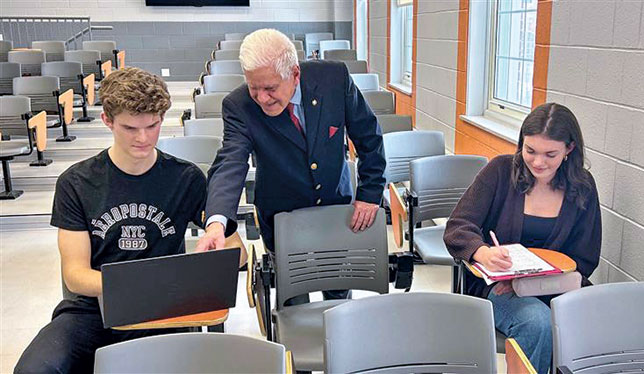Like many students, Caroline Wilson has noticed inflation’s hit on her purchases, from groceries to tuition. Last winter, the then first-year student at the University of New Brunswick learned not only why it was happening but got the chance to propose her own solutions from the student perspective, for 30 per cent of her macroeconomics course mark.
The undergraduate business administration student also had to explain how inflation is calculated, analyze its causes, its impact on students, and describe how it affects the economy as well as macroeconomics.
The semester-long project, in addition to three cumulative content quizzes, gave Ms. Wilson an opportunity to “reflect and use my own interpretations of what was going on by linking the material to current events,” she said. “I felt like I was able to show my stuff a bit more than if I was writing a test.”

It was all an experiment by longtime UNB economics professor Constantine Passaris, who decided to try something different: incorporate experiential learning (EL) into an introductory course. Accustomed to only using EL in upper-year courses, he wanted to see if he could achieve the same content engagement and hands-on learning with fledgling undergraduates.
“I didn’t want to add to the burden by giving them something that looked huge and monumental and unachievable and would have been a disaster in the end,” said Dr. Passaris. “But I was proven wrong.”
EL in a first-year course is “rarer than I would like it to be,” even though UNB has a strategic commitment to provide every student with an EL experience by 2030, said Sarah King, director of its office of experiential education.
Such opportunities proliferate in upper-year courses, treated almost as a “reward” for academic performance, Dr. King said. But introductory courses generally have a lot of content to cover and their class sizes are typically large, two reasons why faculty may, incorrectly, assume that EL isn’t a fit. Project-based assignments however can be turned into manageable EL opportunities with the right design, Dr. King added.
It took several meetings between Dr. Passaris and Dr. King to shift the longtime professor’s skepticism about students’ ability to handle it. Eventually, Dr. Passaris came up with a focused project for his introductory microeconomics course, all of which involved analyzing the state of student financial aid and making recommendations for its improvement.
Students “loved it, they had fun, they did extremely well and their marks reflected that,” said Dr. Passaris, who plans to carry on with EL in his first-year courses, possibly with a certificate attached vouching that the student has applied their learning to real-world problems.
However, quality EL “needs an architecture,” he advised. He regularly checked in with students and provided them with a task checklist and with information resource suggestions, including primary research options such as focus groups and talking to politicians.